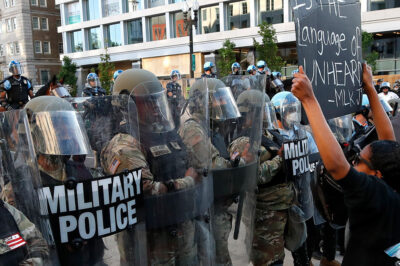Bio
Scott has litigated a broad range of civil rights and civil liberties issues, including access to the courts, disablity rights, discrimination and selective enforcement, freedom of speech and press, habeas corpus, immigrants’ rights, judicial secrecy, LGBTQ+ rights, police misconduct, political protest, post-September 11 abuse of executive power, prisoners' rights, privacy rights, religious freedom, reproductive freedom, the rights of medical marijuana patients, sentencing law, and unreasonable search and seizure. He has additionally litigated cases about class action law, consumers’ rights, and workers’ rights.
Scott is also Shikes Fellow on Civil Liberties and Civil Rights and Lecturer on Law at Harvard Law School, where he teaches Civil Rights Litigation. He has previously taught as clinical or adjunct faculty at American University Washington College of Law, Santa Clara Law School, Seton Hall Law School, and the University of California at Santa Cruz. He is the author of the law school textbook Civil Rights Enforcement (1st ed. 2020, Wolters Kluwer).
Scott has argued before the United States Supreme Court, the highest courts of the District of Columbia and Massachusetts, six federal courts of appeals, and numerous other federal and state courts around the country.
Pending challenge to jail policy of housing transgender individuals based presumptively or solely on anatomy rather than gender identity, Hinton v. District of Columbia, No. 1:21-cv-1295 (D.D.C. filed May 11, 2021)
Pending challenge to unprovoked attack on civil rights demonstrators at Lafayette Square Park in front of the White House on June 1, 2020, by federal and D.C. officers, Black Lives Matter-D.C. v. Trump, No. 1:20-cv-1469 (D.D.C. filed June 4, 2020)
Successful challenge to mass arrests, excessive uses of force, and unlawful conditions of confinement imposed by D.C. police against demonstrators, journalists, and legal observers on Inauguration Day 2017, Horse v. District of Columbia, No. 1:17-cv-1216 (D.D.C. filed June 21, 2017; survived motion to dismiss, Sept. 27, 2019; settled, Apr. 26, 2021)
Successful First Amendment challenge to rules prohibiting administrative employees of the federal judiciary from expressing opinions publicly about partisan candidates for office, joining political parties, attending partisan political events, or contributing money to candidates, Guffey v. Duff, 459 F. Supp. 3d 227 (D.D.C. 2020), appeal pending
Certiorari petition asking Supreme Court to reform or abolish doctrine of qualified immunity for federal civil rights actions; case garnered national media attention and a dissent from denial, Baxter v. Bracey, 140 S. Ct. 1862 (2020) (Thomas, J.)
Two cases (as co-counsel) that obtained injunctions requiring improvements to COVID-19 pandemic precautions at custodial facilities: Banks v. Booth, 468 F. Supp. 3d 101 (D.D.C. 2020) (D.C. Jail), appeal pending, and Costa v. Bazron, 464 F. Supp. 3d 132 (D.D.C. 2020) (in-patient psychiatric hospital), vacated as moot
Successful challenge (as co-counsel) to Trump administration changes to standards for asylum officers’ credible fear interviews, Grace v. Barr, 965 F.3d 883 (D.C. Cir. 2020)
Successful challenge to police department’s failure to collect data on stops and frisks, as required by a D.C. law, Black Lives Matter-D.C. v. Bowser, 2019 WL 4050218 (D.C. Super. Ct. June 27, 2019) (granting injunction; later vacated as moot)
Successful class-action (as co-counsel) challenging Trump Administration’s policy of denying access to abortion for pregnant immigrant minors in the federal government’s custody, J.D. v. Azar, 925 F.3d 1291 (D.C. Cir. 2019)
Successful petition for rehearing in Ortiz-Diaz v. U.S. Dep’t of Housing & Urban Development, 867 F.3d 70 (D.C. Cir. 2017), which reversed dismissal of a Title VII claim for the denial of a lateral transfer based on the employee’s race and national origin; the opinion on rehearing superseded the panel’s prior opinion holding the opposite
Successful defense at the Supreme Court (as counsel of record; co-authored merits brief) of class certification in wage-and-hour class action based on proof by representative sample, Tyson Foods, Inc. v. Bouaphakeo, 577 U.S. 442 (2016)
Successful statutory and common-law action on behalf of consumers whose credit was damaged after a retailer attempted to charge them $3500 for writing critical online review, Palmer v. Kleargear.com, No. 1:13-cv-175 (D. Utah, judgment July 1, 2014); the case helped inspire federal Consumer Review Fairness Act, 15 U.S.C. § 45b, Pub. Law 114-258 (2016), which banned non-disparagement clauses in certain contracts
Successful appeal, on First Amendment grounds, from district court order permitting product manufacturer to litigate a product-safety information case pseudonymously and under seal, Company Doe v. Public Citizen, 749 F.3d 246 (4th Cir. 2014); court held, in matters of first impression, that the public has a First Amendment right to access judicial opinions granting judgment as a matter of law and to access court docket sheets, and that a company’s fear of reputational injury did not overcome the public’s First Amendment right of access to judicial proceedings
Successful en banc petition in First Amendment retaliation case on behalf of police officer who reported abuse of suspects by fellow officers; en banc court ruled for plaintiff officer, Dahlia v. Rodriguez, 735 F.3d 1060 (9th Cir. 2013) (en banc)
Supreme Court capital habeas corpus case raising question whether a schizophrenic petitioner could have proceedings stayed so he could recover mental competence (briefed and argued one of two cases decided together); ruling vacated existing stays but preserved authority of district courts to issues stays, Ryan v. Gonzales, 568 U.S. 57 (2013)
Obtained one of the first evidentiary hearings in the nation challenging the empirical basis for a U.S. Sentencing Guideline; won ruling varying from Guideline for MDMA (ecstasy), United States v. McCarthy, 2011 WL 1991146 (S.D.N.Y. May 19, 2011)
Successful search-and-seizure case before Massachusetts Supreme Judicial Court establishing, as a matter of first impression, that after state decriminalization of personal-use quantities of marijuana, odor of marijuana no longer provides reasonable suspicion of criminal activity under Massachusetts Constitution, Commonwealth v. Cruz, 945 N.E.2d 899 (Mass. 2011)
In connection with his practice, Scott has been quoted by national radio, television, and print media outlets, including NPR, CNN, Fox News, Al Jazeera, Democracy Now, The New York Times, Washington Post, Los Angeles Times, USA Today, U.S. News and World Report, The Independent (U.K.), The New Yorker, Associated Press, Reuters, Politico, Buzzfeed, and National Law Journal, and his commentary and opinion have appeared in SCOTUSblog, Slate, and the Wall Street Journal. His legal scholarship includes The Branch Best Qualified To Abolish Immunity, 93 Notre Dame L. Rev. 1999 (2018); Doing Kimbrough Justice: Implementing Policy Disagreements With the Federal Sentencing Guidelines, 45 Suffolk L. Rev. 1083 (2012) (with Jay Rorty); and Who Can Sue Over Government Surveillance? 57 UCLA L. Rev. 71 (2009), reprinted in 26 Saltzman & Wolvovitz, Civil Rights Litigation & Attorney Fees Annual Handbook 79 (2010).
Before joining the ACLU-DC in 2016, Scott was an attorney with Public Citizen Litigation Group and before that the ACLU Criminal Law Reform Project. Scott graduated magna cum laude from Harvard Law School, where he was an editor of the Harvard Law Review, and he went on to clerk for the Honorable Betty B. Fletcher of the United States Court of Appeals for the Ninth Circuit.
A member of the British royal family once broke his thumb playing football under Scott’s supervision.

